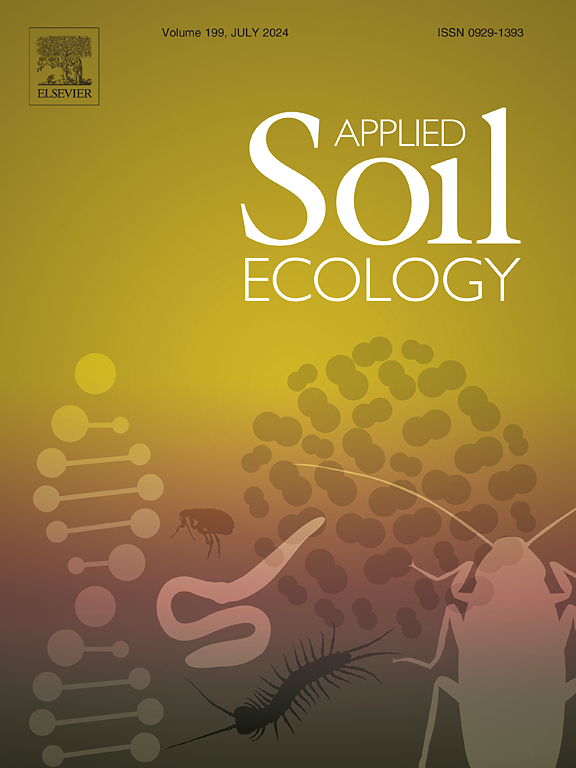Arbuscular mycorrhizal fungi enhance glyphosate resistance in an invasive weed: Implications for eco-environmental risks
IF 4.8
2区 农林科学
Q1 SOIL SCIENCE
引用次数: 0
Abstract
Invasive weeds cause substantial ecological, economical, and social problems, and are currently being controlled by herbicide applications. However, how herbicides affect other ecological interactions of invasive weeds, including their symbiosis with arbuscular mycorrhizal fungi (AMF), remains poorly understood. In this study, we therefore conducted field investigation to understand how the herbicide glyphosate affects the AMF diversity in the rhizosphere of the invasive weed Solidago canadensis. We also performed a greenhouse experiment to study if AMF can contribute to herbicide resistance. The results showed that the AMF colonization rate was significantly higher in S. canadensis when exposed to glyphosate in the field or in greenhouse settings. AMF diversity was also found to be higher in the rhizosphere soil after glyphosate application in the field. AMF colonization in greenhouse experiments also positively correlated with plant growth and reduced amounts of damaged leaves and the plant's content of the stress markers flavonol and anthocyanin. Chlorophyll content was significantly enhanced by AMF colonization, regardless of glyphosate application. These results indicate that herbicide can promote AMF colonization and diversity, and that AMF can enhance the herbicide resistance of S. canadensis. These findings suggest that herbicide application may promote the spread of S. canadensis through enhanced microbial interactions, posing new eco-environmental risks.
丛枝菌根真菌增强入侵杂草的草甘膦抗性:对生态环境风险的影响
入侵杂草造成了严重的生态、经济和社会问题,目前正在通过除草剂进行控制。然而,除草剂如何影响入侵杂草的其他生态相互作用,包括它们与丛枝菌根真菌(AMF)的共生关系,仍然知之甚少。因此,在本研究中,我们进行了实地调查,以了解除草剂草甘膦如何影响入侵杂草加拿大一枝黄花根际AMF多样性。我们还进行了温室试验,研究AMF是否有助于抗除草剂。结果表明,在田间或温室环境下,AMF在加拿大葡萄中的定殖率显著高于草甘膦。田间施用草甘膦后,根际土壤AMF多样性也有所提高。温室试验中AMF定殖与植株生长、受损叶片数量减少以及植株中胁迫标志物黄酮醇和花青素含量呈正相关。无论施用何种草甘膦,AMF定殖均显著提高了叶绿素含量。这些结果表明,除草剂可以促进AMF的定植和多样性,AMF可以增强加拿大葡萄的抗除草剂能力。这些结果表明,施用除草剂可能通过增强微生物相互作用促进加拿大草的传播,并造成新的生态环境风险。
本文章由计算机程序翻译,如有差异,请以英文原文为准。
求助全文
约1分钟内获得全文
求助全文
来源期刊

Applied Soil Ecology
农林科学-土壤科学
CiteScore
9.70
自引率
4.20%
发文量
363
审稿时长
5.3 months
期刊介绍:
Applied Soil Ecology addresses the role of soil organisms and their interactions in relation to: sustainability and productivity, nutrient cycling and other soil processes, the maintenance of soil functions, the impact of human activities on soil ecosystems and bio(techno)logical control of soil-inhabiting pests, diseases and weeds.
 求助内容:
求助内容: 应助结果提醒方式:
应助结果提醒方式:


